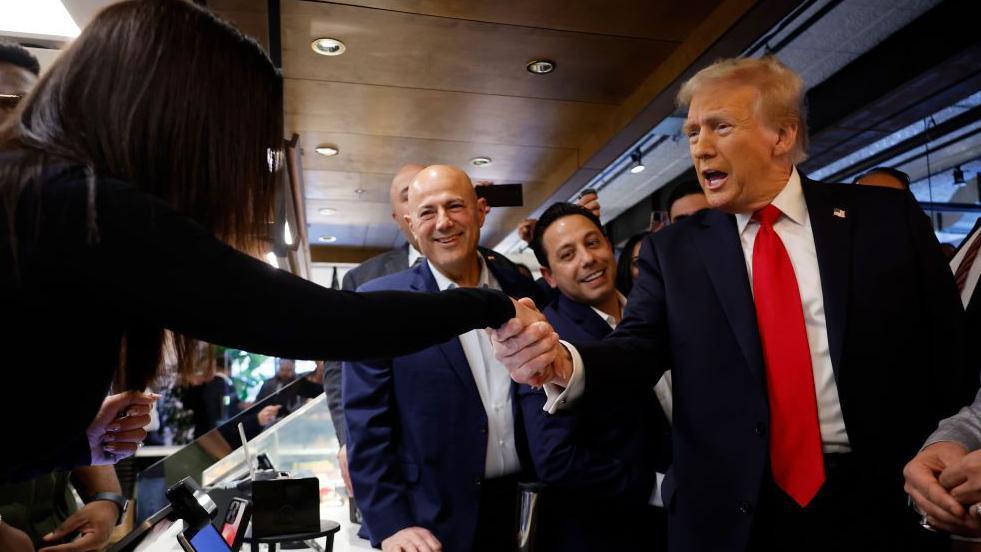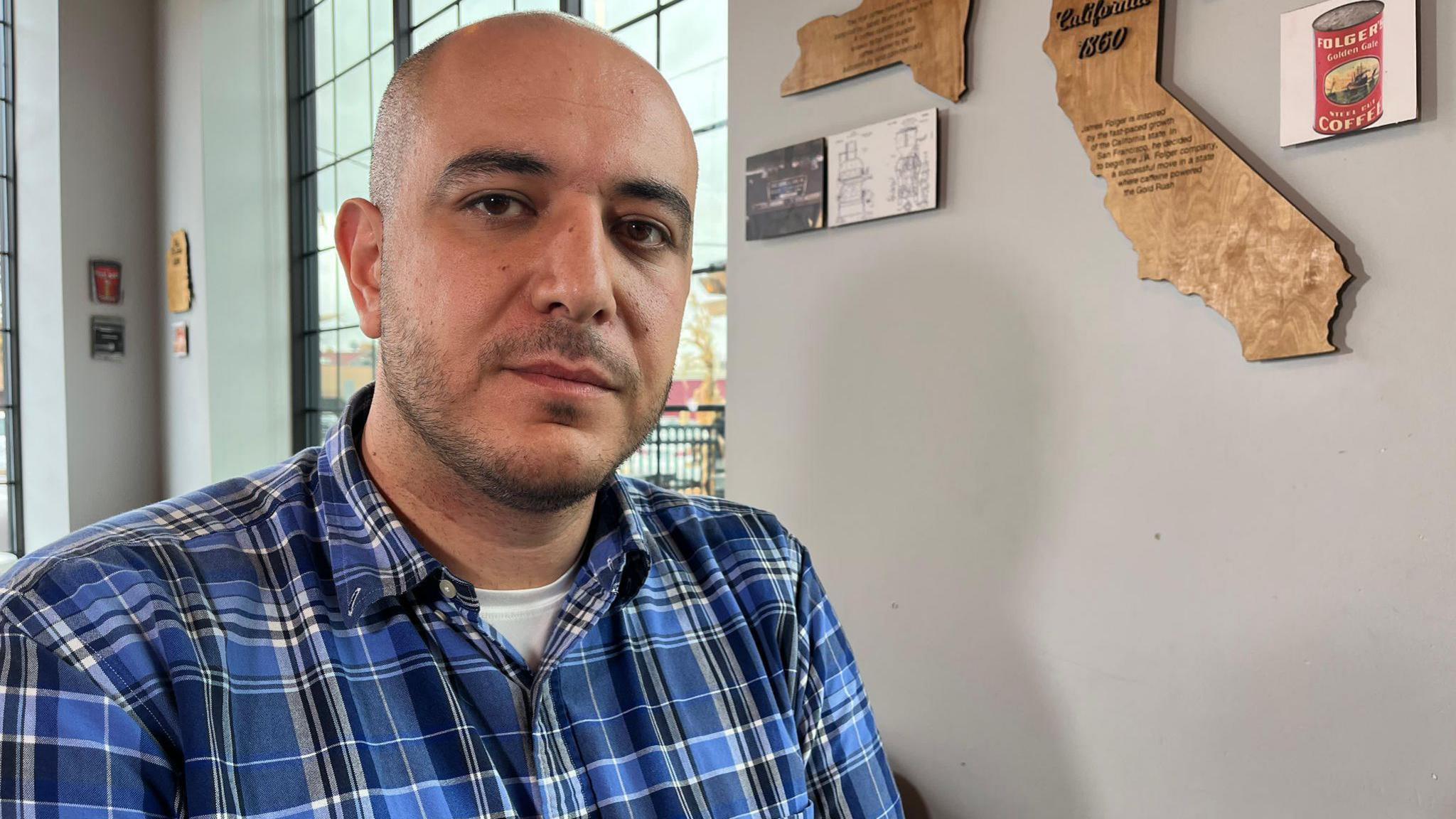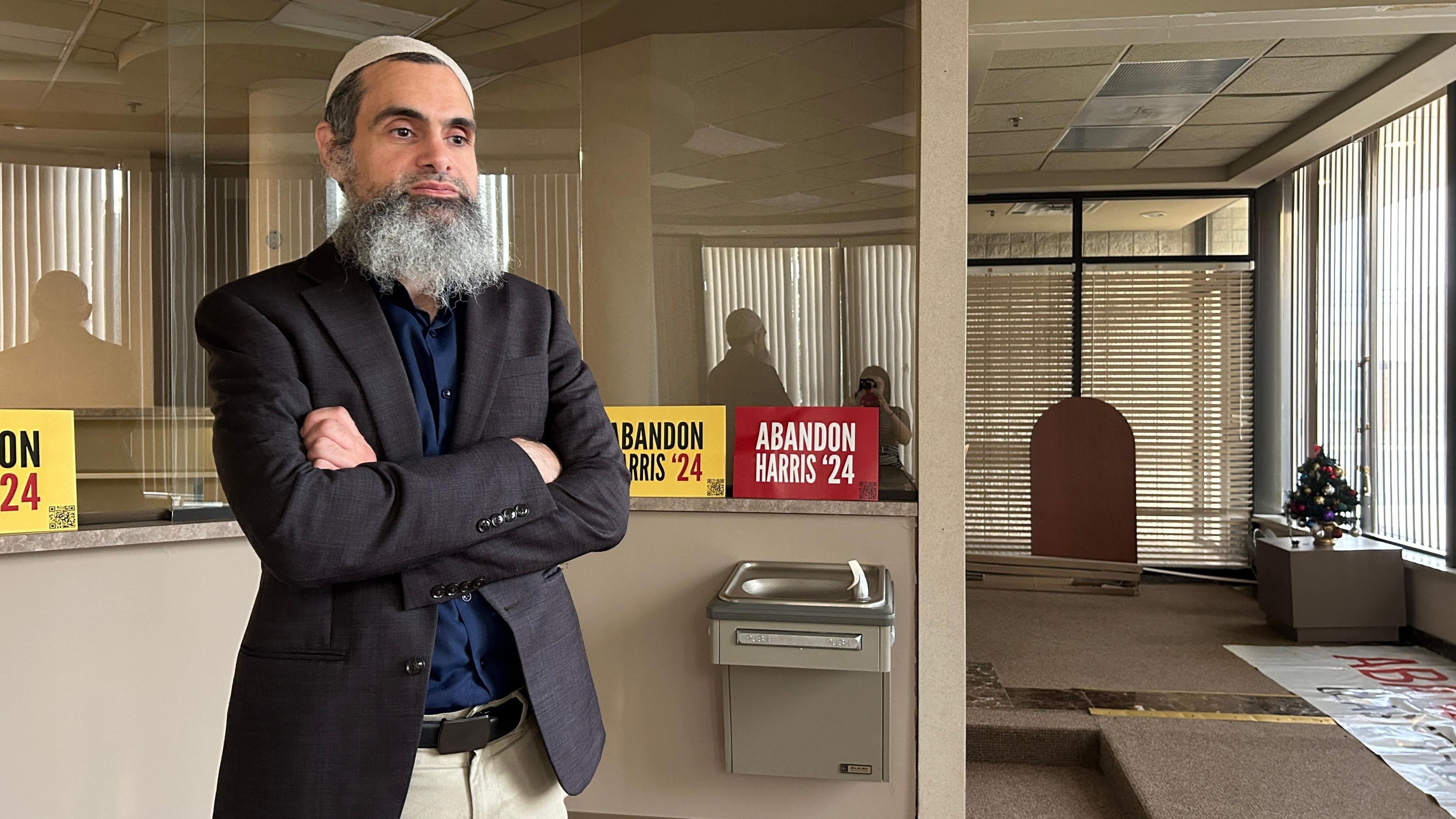Trump courts divided Arab-American voters in must-win Michigan

Trump met with Arab-American business leaders in Dearborn, Michigan, on Friday
- Published
On a crisp, sunny day in the largest Arab-majority city in the US, dozens of people gathered outside the Great Commoner cafe to catch a glimpse of Donald Trump.
“What we want is peace,” Trump told a group of Arab-American business leaders inside the Dearborn, Michigan, restaurant - days before the presidential election.
But a crowd of pro- and anti-Trump voters shouting at one another nearby demonstrated how divided the Michigan community has become over choosing the best American president to handle the escalating Middle East war.
The Republican’s Friday visit to Dearborn, once a reliably Democratic area, marks the culmination of his efforts to court the 200,000-plus Arab-Americans who live in must-win Michigan. It could sway a tied race between Trump and Kamala Harris. Hillary Clinton lost Michigan to Trump by only 10,000 votes in 2016, while Biden won it back by 150,000 votes in 2020.
On billboards lining Michigan highways and during visits, the Trump campaign argues that he stands “for peace” in the Middle East, while casting Harris as pro-Israel.
That message has worked on some. Trump secured two endorsements from the mayors of Dearborn Heights, and Hamtramck, a small Muslim majority city near Detroit, while Dearborn Mayor Abdullah Hammoud said Friday he declined a meeting with the former president.
The trend worries Abbas Alawieh, one of the leaders of the Uncommitted movement - a group protesting US support of Israel - who pledged to back Harris even though his group refused to endorse her.
“I’ve been hearing … a lot more of the feeling that this is a binary choice, and some voters feeling like maybe we should just vote for Donald Trump because he’s saying he’s a pro-peace candidate,” Mr Alawieh told the BBC at Haraz Cafe in Dearborn on Friday.

Abbas Alawieh, a leader of the Uncommitted movement, has faced backlash for his decision to support Harris despite his opposition to the Biden-Harris administration's Israel policies
The Harris campaign, meanwhile, said the vice-president has been and is supportive of the “diverse Muslim community” in the US.
"The Vice President is committed to work to earn every vote, unite our country, and to be a President for all Americans,” said Nasrina Bargzie, campaign director of Muslim and Arab American Outreach. She added that Harris would ensure the community can “live free from the hateful policies of the Trump administration”.
Despite frustrations with the Biden-Harris administration’s handling of the war, several community leaders told the BBC they don’t believe Trump offers a solution either.
“We’re not naive about what he means for our community,” said Rexhinaldo Nazarko, executive director of the American Muslim Engagement and Empowerment Network, a Michigan Muslim advocacy group. He cited Trump’s “Muslim ban”, his 2017 executive order to ban travelers from predominately Muslim nations.
Still, Mr Nazarko and other leaders said sending a message about their anger over the Biden-Harris administration’s pro-Israel policies is more important than who wins the White House.
They have encouraged votes for third-party candidates rather than sitting out the election.
That’s the message Hassan Abdel Salam, a leader of the Abandon Harris campaign and former Democrat, delivered to a packed room gathered for prayer at the American Muslim Center in Dearborn on Friday.
"Our intention is to show that we are punishing someone, a leader who for a year we protested and we gave ultimata, warnings," he said. "Our belief now, even despite having lived under Trump, a truly vile person, has been that we now see that there is no lesser evil."

Hassan Abdel Salam, a former Democrat, is encouraging other Arab Americans and Muslims to vote against Trump and Harris for a third-party candidate
Muslim leaders and political experts acknowledge that the Harris campaign has decided to focus more on securing moderate voters and improving turnout in traditionally Democratic areas like Detroit, rather than courting Muslims and Arab-Americans.
The campaign also is concerned about losing support from pro-Israel Jewish voters and other Democrats more likely to cast a ballot, said Saeed Khan, a Wayne State University professor.
Mr Khan said many voters who considered casting a ballot for third-party candidates, likely will end up voting for Harris to keep Trump out of office.
It’s a calculation Wael Alzayat, CEO of Muslim voter outreach group Emgage, hopes Michigan voters, in general, will make.
“A vote for third-party is a vote for Trump, which will bring about the worst outcome,” he said. “Trump is a brick wall.”
Mohammed Hassan, a member of Hamtramck's fully Muslim city council, said he believed the majority of his 25,000-strong Bangladeshi Muslim community is voting for Harris and the rest for Trump.
But, he said, all Muslims don't necessarily agree.
“Yemeni Muslims in the same city may go 50-50 between Trump and Harris,” he said.
Still, several imams who have endorsed Trump are of Yemeni descent, as well as Hamtramck's Yemeni Mayor Amer Ghalib. No prominent election polling has been conducted among Michigan's Bangladeshi and Yemeni communities.
Many Arab Americans and Muslims crave a more “balanced narrative” about the war, including more empathy for the suffering of Gazans and Lebanese, Mr Khan said.
“For Harris to talk about 100 some-odd [Israeli] hostages, and not mention 45,000 to 50,000 Gazans killed, to not consider that there was an impact on American citizens, families and lives, that I think was seen as egregious," he said.
Over 43,000 people have been killed in Gaza since Israel launched a campaign to destroy Hamas after the group's October 2023 attack, according to the Hamas-run health ministry. About 1,200 people were killed and 251 others were taken hostage in the attack.
None of this makes the decision to support Harris easy, said Mr Alawieh, the Uncommitted leader.
Her campaign made a mistake by not budging on Israel, which also may cost her support from Democratic young voters or voters of colour, he said.
“It feels to me like the Harris campaign here in Michigan left a lot of votes on the table,” Mr Alawieh said. “I hope they’re doing that as part of some calculation that she wins. I hope that after this election, we don’t look back at her campaign and say ‘Maybe we shouldn’t have left those votes on the table.’”

